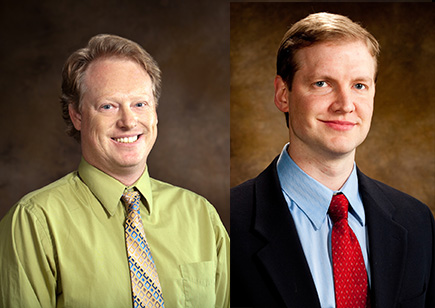University of Arkansas Sees Significant Increase in NIH Funding
FAYETTEVILLE, Ark. – The University of Arkansas closed fiscal year 2014, which ended June 30, with National Institutes of Health funding totaling $3.4 million.
That total represented an increase of 21 percent from fiscal 2013 and 54 percent from fiscal 2012, when the amounts were $2.8 million and $2.2 million, respectively.
The state’s flagship university has seen its annual NIH funding significantly increase in recent years, helping the institution’s scientists pursue discoveries that address society’s pressing health issues.
“The increase in our NIH funding is a validation of the quality of the health research that is occurring at the University of Arkansas,” said Sharon Gaber, provost and vice chancellor for academic affairs. “We are confident that continued growth in this area will help us reach our institutional goal of becoming one of the nation’s top 50 research universities.”
Jim Rankin, vice provost for research and economic development, said, “I am encouraged by the upswing in both the number of projects being awarded and the funding amounts. Many research universities have experienced declining NIH funding in the past few years.”
Rankin’s office, with the encouragement of Provost Gaber, created a health initiative two years ago that brought together faculty from across campus who share research interests. The initiative is helping spur multidisciplinary research collaborations, Rankin said.
“We are also cultivating relationships between our faculty and their colleagues at the University of Arkansas for Medical Sciences,” said Rankin, referring to the state’s health sciences campus in Little Rock. “When they talk to each other, they might find out if someone else has a similar interest and hopefully they can put together a joint grant proposal.”
Some specific areas that could be tapped for partnerships include biomedical engineering, physical therapy, kinesiology, research commercialization and health administration, Rankin said.
The university’s establishment of a Department of Biomedical Engineering in the College of Engineering has also contributed to the NIH funding increase, Rankin said. Faculty members in the department received NIH grants totaling $1.2 million in fiscal 2014 — 35 percent of the campus’ overall total.
“Biomedical research is very expensive and requires the investment of significant resources,” said David Zaharoff, an assistant professor of biomedical engineering, who was awarded $718,286 from the NIH for his cancer research this past fiscal year. “NIH grants provide significant and sustained investments, which allow us to purchase necessary research supplies and recruit high-quality graduate students. These, in turn, allow us to increase the impact of our exploration into pressing public health concerns.
“Without NIH funding, my lab would not be nearly as effective in our efforts to reduce cancer mortality,” he said. “It’s the difference between surviving and thriving.”
Jeff Wolchok, an assistant professor of biomedical engineering, was awarded $437,248 for a study to design and test a biomaterial that can regenerate damaged skeletal muscle.
“Because of the geographical divide, our undergraduates have limited exposure to UAMS research,” Wolchok said. “The NIH funding I have received allows our students to participate in cutting-edge biomedical research right here in Fayetteville. These students are better-prepared and more competitive for academic and professional opportunities following graduation.”
About the University of Arkansas
The University of Arkansas provides an internationally competitive education for undergraduate and graduate students in a wide spectrum of disciplines; contributes new knowledge, economic development, basic and applied research and creative activity; and provides service to academic and professional disciplines and to society in general, all aimed at fulfilling its public land-grant mission to serve Arkansas and beyond as a partner, resource and catalyst. The Carnegie Foundation classifies the University of Arkansas among only 2 percent of universities in America that have the highest level of research.
Topics
Contacts
Sharon Gaber, provost and vice chancellor for academic affairs
Academic Affairs
479-575-5459,
sgaber@uark.edu
Jim Rankin, associate vice provost for research and economic development
Academic Affairs
479-575-2470,
rankinj@uark.edu
Chris Branam, research communications writer/editor
University Relations
479-575-4737,
cwbranam@uark.edu
Headlines
U of A's Inspirational Chorale Makes Its Carnegie Hall Debut
The U of A's Inspirational Chorale took center stage at Carnegie Hall in March, performing under the direction of professor Jeffrey Murdock to a packed audience at the iconic Stern Auditorium.
The State of Economics With Mervin Jebaraj Set for June 5
U of A economist Mervin Jebaraj will analyze state's economic trends and regional issues in an upcoming talk. Preregistration is required by May 31.
Faculty Demonstrate Dedication to Student Success Through Teaching Credentials
Eight faculty members from across the U of A have earned the prestigious Association of College and University Educators certification in Effective College Teaching.
Artificial Intelligence, Machine Learning Boost Arkansas Animal Science Research
Aranyak Goswami, a bioinformatics specialist, will work with three different departments to boost the research arm of the U of A System Division of Agriculture.
College of Education and Health Professions Doctoral Student Picked for Grosvenor Fellowship
Jessica Culver, a doctoral student in the College of Education and Health Professions Adult and Lifelong Learning program, has been selected as a member of the 2024 Grosvenor Teacher Fellowship.





